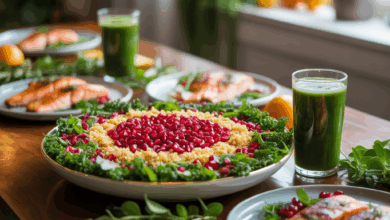The importance of protein for gym gains — How to fuel stronger, leaner muscles

Ever finished a killer training session and wondered why your strength or muscle size hasn’t budged despite all the effort? You’re not alone. Many gym-goers crush workouts but overlook the one nutrient that actually builds and repairs muscle: protein. Understanding the importance of protein for gym gains can turn your time in the gym into visible progress and fewer frustrating plateaus.
The importance of protein for gym gains
Protein is the building block of muscle. When you lift weights, you create microscopic tears in muscle fibers. Protein supplies the amino acids needed to repair and rebuild those fibers, making them stronger and, with the right stimulus and energy balance, larger. Beyond muscle synthesis, dietary protein supports recovery, immune function, and satiety — all important for consistent training and body composition improvements.
How protein builds muscle: the science in plain English
Resistance training increases muscle protein breakdown, while protein consumption stimulates muscle protein synthesis (MPS). If MPS exceeds breakdown over time, you gain muscle. Key factors that influence this balance:
- Adequate daily protein intake (total grams per day)
- Protein quality — complete proteins with all essential amino acids, especially leucine
- Protein timing — spreading protein evenly across meals and post-workout intake
- Training stimulus — progressive overload and appropriate volume
- Calorie balance — surplus for fast gains, maintenance or slight deficit for lean gains
How much protein do you need?
There’s no one-size-fits-all number, but practical ranges work well:
- General fitness: 0.8–1.0 g/kg bodyweight per day
- Muscle gain and strength training: 1.6–2.2 g/kg bodyweight per day
- Calorie-restricted/leaning out while keeping muscle: 2.0–2.4 g/kg bodyweight per day
Simple formula
Multiply your bodyweight in kilograms by 1.6–2.0 for a solid target. Example: a 75 kg lifter aiming for muscle gain should consume roughly 120–150 g of protein daily.
Meal distribution
Spread protein across 3–5 meals. Aim for 20–40 g of high-quality protein per meal to consistently stimulate MPS throughout the day.
Best times to eat protein
Timing isn’t everything, but it helps. Prioritize these windows:
- Post-workout (within 1–2 hours): 20–40 g of fast-digesting protein supports recovery
- Pre-sleep (casein or mixed meal): 20–40 g can support overnight muscle repair
- Even spacing: Regular protein meals improve recovery and appetite control
Protein sources: whole foods and supplements
Choose a mix of complete proteins and plant varieties to hit your targets without boredom.
- Animal sources: chicken, turkey, lean beef, pork, fish, eggs, dairy (Greek yogurt, cottage cheese)
- Plant sources: soy, pea protein, lentils, chickpeas, quinoa, tofu, tempeh — combine to ensure full amino acid profiles
- Supplements: whey protein for fast post-workout protein, casein before bed, and plant-based protein powders for vegetarian athletes
Practical tips to boost protein intake
- Start meals with a protein portion — plan 120–200 g cooked meat/fish or 3–4 eggs per main meal for higher targets
- Add a scoop of protein powder to smoothies, oatmeal, or pancakes for an easy 20–30 g boost
- Use Greek yogurt, cottage cheese, or hummus as snacks to increase daily totals
- Meal prep: cook lean proteins in bulk to avoid reaching for low-protein convenience foods
Workout variations and pairing them with protein
Different training styles influence how you use protein:
Hypertrophy-focused (muscle size)
- Programs: 8–12 reps, 3–5 sets, moderate rest, time under tension
- Protein tip: prioritize post-workout protein (20–40 g) and spread meals to support frequent MPS bursts
Strength-focused (max force)
- Programs: low reps (1–6), heavy loads, longer rest
- Protein tip: slightly higher daily protein (toward the 2.0 g/kg end) supports nervous system recovery and muscle repair after high-intensity sessions
Full-body or frequency-based training
- Programs: 3+ full-body sessions per week
- Protein tip: moderate protein per meal and consistent intake helps cumulative recovery across sessions
Real-world example: Sarah, a 68 kg recreational lifter on a 3-day full-body split, targets 1.8 g/kg = 122 g protein/day. She eats 30–35 g at breakfast, 40 g post-workout lunch, 25 g dinner, and 20 g snack — consistent and manageable.
Lifestyle factors that amplify protein benefits
- Sleep: Poor sleep hampers recovery. Aim for 7–9 hours to maximize muscle adaptation.
- Hydration: Water is essential for nutrient transport and performance.
- Calorie control: If you want size, be in a modest calorie surplus; for lean gains, prioritize protein while losing fat slowly to preserve muscle.
- Stress management: High stress increases catabolic hormones that can interfere with gains; use recovery days, mobility work, and mindset practices.
Common mistakes to avoid
- Relying completely on supplements — whole foods offer other important nutrients.
- Underestimating portion sizes — track for a week to learn your intake.
- Skipping protein at breakfast — spreading intake matters more than loading one meal.
- Ignoring calorie balance — protein can’t build muscle in a deep calorie deficit.
Frequently Asked Questions
Aim for roughly 1.6–2.2 g/kg of bodyweight per day for muscle growth. Adjust based on training intensity, goals, and whether you’re cutting or bulking.
No — whey is a convenient, fast-digesting option that’s effective post-workout, but whole-food proteins or high-quality plant proteins can be equally effective when daily targets are met.
Yes. Focus on higher total intake (toward the upper end of 1.6–2.2 g/kg), combine complementary plant proteins (e.g., rice + pea), and consider fortified or concentrated protein powders to meet goals.
Conclusion — take action and prioritize protein
Understanding the importance of protein for gym gains is the fast-track to better results. Protein repairs and builds muscle, supports recovery, and helps you stay on track with body-composition goals. Start by calculating your daily target, spreading protein across meals, and aligning your food choices with your training program. Small, consistent changes — a protein-packed breakfast, a post-workout shake, and smart meal prep — yield big payoffs in strength and muscle over months.
Ready to put this into practice? Check out our workout routines to match your training to your protein plan, browse our nutrition guides for meal ideas, or explore wellness tips to optimize sleep and recovery. Commit to consistent protein habits for 8–12 weeks and track your progress — your next PR might be closer than you think.
What will you change about your protein plan this week? Try adding one extra quality protein meal and see how your recovery improves.





